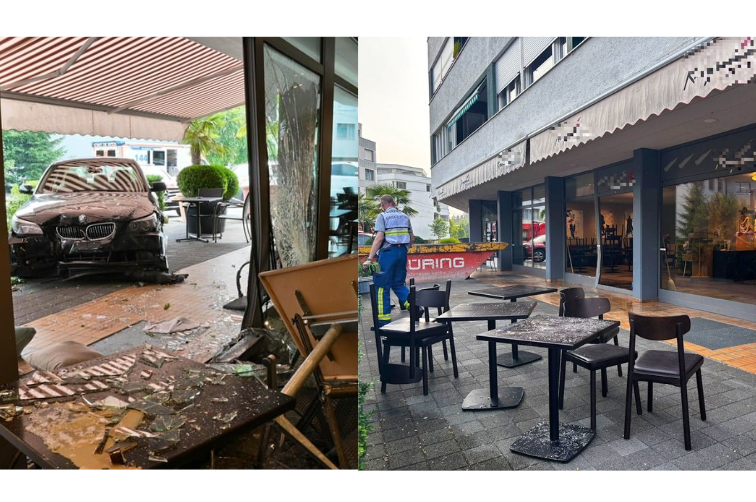When an elderly man lost control of his BMW and crashed into a busy terrace in a quiet area of Lucerne, what had begun as a calm café evening descended into a scene of panic. Within seconds, the impact sent windows shattering, chairs flying, and guests scurrying. Josef Kreyenbühl, the owner of the café, claims that his staff had just started working the evening shift when the collision occurred, tearing through the hedge and hitting the glass wall of the building with a loud thud.
This case is already igniting discussions about safety laws and public accountability because it bears striking similarities to other incidents involving senior drivers throughout Europe. Kreyenbühl, who was clearly upset but remarkably calm, highlighted how quickly his team reacted. He said in a steady but earnest tone, “We took care of each other, and by 11 p.m., we had cleared most of the debris.” “Everyone was sitting on the terrace in peace when it happened all of a sudden.”
| Key Detail | Information |
|---|---|
| Incident Location | Würzenbach District, Lucerne, Switzerland |
| Incident Time | Tuesday Evening |
| Involved Vehicle | BMW Sedan Driven by 81-Year-Old Man |
| Café Owner | Josef Kreyenbühl |
| Number of Injuries | Two Serious Injuries, Several Others Traumatised |
| Estimated Property Damage | Approximately 100,000 Swiss Francs |
| Immediate Response | Lucerne Fire Department, Medical Team, Psychological Care Unit |
| Current Business Status | Reopened Within 24 Hours |
| Suspected Cause | Mechanical Failure or Loss of Control |
| Driver’s Legal Status | License Confiscated Pending Investigation |
The café had already reopened by Wednesday morning. That quick recovery was an indication of resiliency as much as logistics. However, care teams are stepping in to offer emotional support as staff members continue to experience high levels of psychological stress. Still trembling, workers have supported one another, putting up a strikingly cohesive front. “We embrace each other here,” as Kreyenbühl put it so eloquently.
The BMW drove straight through the hedge without braking, according to eyewitness accounts. “He didn’t seem to slow down—it was as if he never saw us,” remarked one visitor, who wished to remain anonymous. The car barely avoided more serious injuries when it came to a stop between the large front windows and the café tables. The degree of emotional trauma sustained by the two guests is still being evaluated.
This wasn’t merely a small mishap; it resulted in extensive damage below the surface. About 400 kilograms of flour were rendered useless when heating radiators broke off, causing water to flood the basement. As soon as they got there, the fire department pumped out the water and assessed the structural damage. Given that the entrance frame is noticeably bent and that electrical components might also need to be replaced, Kreyenbühl estimates that the repairs will be costly.
This café is more than just a business to many locals. It’s a place of custom, belonging, and daily comfort. More than just missing meals would result from its closure, even for a short time. “A closure would result in financial loss, yes—but more importantly, it would disrupt our sense of normalcy,” Kreyenbühl said in acknowledgment of this. That mindset, which is especially positive, highlights how deeply ingrained these local institutions are in day-to-day existence.
Admiration for Kreyenbühl has grown again as a result of his remarkably effective leadership during such chaos. His proactive approach turned an unpleasant incident into a tale of community healing. His prompt actions—cleaning up late into the night, consoling his staff, and reopening right away—provided insight into how companies can demonstrate exceptional human worth even in the face of tragedy.
The investigation is still ongoing. The old man’s license has been seized, the police confirmed. They think there may be a technical problem or age-related decline-related loss of control. This has rekindled discussions about senior citizen driving laws. Like many other nations, Switzerland relies on routine checkups rather than a set upper age limit for drivers. However, as demonstrated here, these assessments might not be sufficient.
Similar cases have advanced the discussion over the last ten years. A similar incident outside a pharmacy in Geneva was recently caused by a 79-year-old driver. Lawmakers responded by talking about more stringent requirements for driving tests after the age of 75. These kinds of measures are becoming more popular as the population ages. Events such as the Lucerne crash accentuate the delicate balance that frequently exists between personal autonomy and public safety.
The way this incident reveals both individual vulnerability and group strength is what makes it so powerful. The guests were frightened. Employees were emotionally spent. But after a day, the tables were reset, the espresso machine was turned back on, and regulars began to arrive. Only mutual support and unwavering dedication made that turnaround—notably quick—possible.
From a broader perspective, these kinds of incidents change our perception of public safety. Although sidewalk terrace cafés are praised for their charm, they are situated right next to walkways where mishaps like these can occur. Physical barriers or reinforcements may soon need to be taken into account by urban planners as necessary safety features rather than as ways to discourage ambiance.
Celebrity voices have also given this topic more traction in recent years. Helen Mirren, an actress, has advocated for proactive evaluations instead of reactive ones after her father had a stroke while driving in his 80s. In a similar vein, Swiss broadcaster Kurt Aeschbacher, who lost a friend in a similar incident, has openly called for more scrutiny of senior drivers.
However, recovery is in progress. This café is not only recovering, but also redefining what recovery means thanks to support, shared memories, and incredible resilience. Every broken chair or chipped tile has been replaced by a moment of introspection, a tale told over a cappuccino, and the knowledge that progress is not only feasible but essential.



